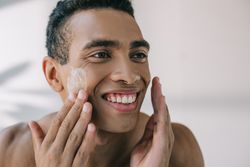Should You Still Moisturize If You Have Oily Skin?

Having an oily complexion can lead you to believe that your skin is overly hydrated and that using a moisturizer will just make it worse. If your oily skin has led to problems like acne breakouts, it could make you especially hesitant. However, using a moisturizer approved by your skin surgeon can actually reduce the amount of oil your skin secretes. Below is a guide to why oily skin types can benefit from moisturizers and tips for your skincare routine.
Why You Still Need a Moisturizer
Your oily complexion is caused by sebum, the oil your skin naturally secretes to protect itself and act as a barrier against irritants. Sebum is necessary in small to moderate amounts, but it feeds into acne-causing bacteria and traps dirt against your pores. It doesn’t hydrate your skin, and in excess, it can lead to problems like shiny skin and acne breakouts. Excessive sebum production can actually be caused by skin that’s stressed from lack of hydration, as well as hormonal changes and inflammation.
Using appropriate moisturizers can reduce your sebum production. Where sebum sits on top of the skin, moisturizers penetrate into and are absorbed by it, leading to hydration. Hydrated skin is firmer, healthier, and less stressed, so sebum production is slowed. This is why your skin surgeon and care specialist may recommend moisturizers to combat oily complexions.
How You Should Moisturize Oily Skin
 Some moisturizers can feel heavy on your skin and make it appear greasier. If you already have oily skin, you’ll want to avoid this. Look for moisturizers designed specifically for oily skin, or ask your skin surgeon and specialist to recommend a few.
Some moisturizers can feel heavy on your skin and make it appear greasier. If you already have oily skin, you’ll want to avoid this. Look for moisturizers designed specifically for oily skin, or ask your skin surgeon and specialist to recommend a few.
Those made with plant extracts—like jojoba or olive oil—or paraffin-based ingredients will be light and are absorbed quickly. They include natural nutrients like sterols and sterolins that soften and strengthen skin.
Moisturize each day, ideally after you get out of the shower so the moisture is locked into your skin, and be wary of other products you’re using in your routine. Some acne treatments like chemical face peels and washes can dry and irritate skin unless you use proper moisturizers, leading to more sebum production. Be sure to have your routine checked by a skincare professional.
Are you tired of struggling with oily skin? Skin surgeon and dermatologist Lauren A. Daman, MD, PC in Hartford, CT, has years of experience in treating skin conditions, including acne. Her team will develop a personalized skincare plan, with recommended moisturizers and treatments like phototherapy, chemical face peels, or microdermabrasion to help slow oil production. Learn more about their services online, and call (860) 246-3533 for a consultation.
About the Business
(2 reviews)
Have a question? Ask the experts!
Send your question

